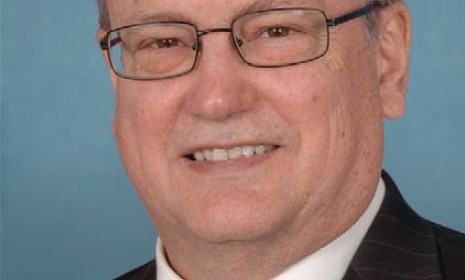7 most ironic political scandals
Rep. Mark Souder's resignation came with a twist: A video in which his mistress quizzed him on his abstinence views. But he's hardly the only politician to be exposed so ironically

A free daily email with the biggest news stories of the day – and the best features from TheWeek.com
You are now subscribed
Your newsletter sign-up was successful
Washington has had its share of political scandals — sexual and otherwise. But sometimes the stark contrast between a politician's predicament and the values he's championed throughout his career makes the shame even more indelible. Here, starting with the shocking affair that brought down family values conservative Rep. Mark Souder this week, a list of seven of the most ironic political scandals in recent memory:
1. Mark Souder's failure to abstain
Indiana Republican Rep. Mark Souder abruptly resigned this week after confessing to an affair with part-time staffer Tracy Jackson and issuing a standard apology to both his family and God. In an eyebrow-raising twist, however, a web video surfaced in which Jackson interviewed Souder about, among other issues, his advocacy of abstinence education. "In 2006," Jackson notes in the clip, "you had your staff conduct a report entitled 'Abstinence and its Critics' which discredits many claims purveyed by those who oppose abstinence education."
The Week
Escape your echo chamber. Get the facts behind the news, plus analysis from multiple perspectives.

Sign up for The Week's Free Newsletters
From our morning news briefing to a weekly Good News Newsletter, get the best of The Week delivered directly to your inbox.
From our morning news briefing to a weekly Good News Newsletter, get the best of The Week delivered directly to your inbox.
2. George Rekers' travel companion
High-profile conservative George Rekers recently resigned from the National Association for Research and Therapy of Homosexuality, a leading force in the movement to "cure" homosexuality, after he was caught renting a young male prostitute for a 10-day European vacation. Rekers said he was stepping down "to allow myself the time necessary to fight the false media reports that have been made against me." NARTH attached a statement to to Rekers' announcement saying his apparent hypocrisy does not reflect on their work.
3. Al Gore's electric bill
The former Democratic vice president has won a Nobel Prize and an Oscar for his work publicizing the threat of global warming. But a few years ago, the Tennessee Center for Policy Research reported that the Gore family burns more electricity in one month at its 10,000-square-foot mansion than the average Nashville family uses in a year. (In 2007, the Gores' average monthly bill, according to utility records, was $1,200.)
A free daily email with the biggest news stories of the day – and the best features from TheWeek.com
4. Mitt Romney's gardener
Former Massachusetts governor Mitt Romney called for a crackdown on illegal immigration when he was running for the 2008 Republican presidential nomination. But the landscaping company that tended his lawn in 2007 was caught — twice — using undocumented Guatemalan workers to tend Romney's lawn and tennis court.
5. Newt Gingrich's unfortunate timing
Since leaving Congress, former House speaker Newt Gingrich has admitted that he was cheating on his then-wife while he led the fight against then-president Bill Clinton over the Monica Lewinsky affair. But Gingrich, a Republican, said that didn't make him a hypocrite. Clinton wasn't impeached in 2008 for infidelity, Gingrich said, but for lying about it under oath to a judge, and "you cannot accept... perjury in your highest officials."
6. Eliot Spitzer, crime-stopper
Former New York governor — and rumored CNN host-to-be — Eliot Spitzer built his career as a "beacon of justice, the scrappy David taking down the Goliaths of Wall Street, the insurance industry, and yes, even prostitution," says Newsweek. So when news broke that Spitzer, a Democrat, had been deceiving his wife and political allies by sneaking off to visit $1,000-an-hour prostitutes, he became a poster boy, says author Peter Elkind in Rough Justice: The Rise and Fall of Elliot Spitzer, for "the chasm between public image and private reality."
7. Strom Thurmond's views on race — in the bedroom
Strom Thurmond — whose political career as a South Carolina governor and Senator spanned decades — ran for president in 1948 as the segregationist States Rights Democratic Party candidate, winning 39 electoral votes. In one speech, he said, "There's not enough troops in the army to force the Southern people to break down segregation and admit the nigra race into our theaters, into our swimming pools, into our homes, and into our churches." Thurmond's views on race later softened, though he never explicitly renounced segregation. Shortly after his death in 2003, a Los Angeles woman named Essie Mae Washington-Williams, whose mother was a black maid for Thurmond's family, revealed that she was Strom Thurmond's daughter.